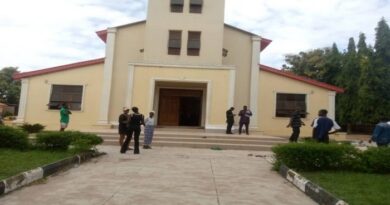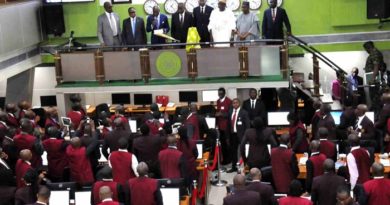JAMB registrar, Prof. Oloyede’s speech at stakeholders at meeting on 2018 UTME
BEING THE OPENING REMARKS OF PROF. IS-HAQ OLANREWAJU OLOYEDE, OFR, FNAL REGISTRAR, JOINT ADMISSIONS AND MATRICULATION BOARD (JAMB), AT THE STAKEHOLDERS’ MEETING HELD AT THE NATIONAL JUDICIAL INSTITUTE, ABUJA ON TUESDAY, 9 JANUARY, 2018
PROTOCOLS
CONSOLIDATING THE GAINS, PUSHING THE FRONTIERS
- INTRODUCTION
I heartily welcome you all to this Stakeholders’ Meeting. Some of you were part of our last year, 2017 Unified Tertiary Matriculation Examination (UTME) efforts while a few of you have just been onboarded. Stakeholders’ meetings and other forms of engagement have become a most potent strategic platform to share and validate the Board’s vision, solicit and obtain feedbacks and input, ensure buy-in of critical stakeholders and generally exchange information and create awareness.
This approach, which is being ingrained in all facets of the Board’s activities as we strive to achieve our mandate, is paying great dividends and our 2017 UTME achievements would have been less without the benefits of involvement of you, our stakeholders. Once again, I thank you all for the selfless sacrifice. Your efforts are not just in support of JAMB, or the Tertiary Education System, together, we are contributing our own quota to the task of building our dear country, Nigeria.
Engagement of Stakeholders in preparations for the 2018 UTME commenced in November and the following were some of the sessions held so far:
- Mobile Money Operators: To provide more platforms and ease the process of payment for the 2018 UTME Application Forms by candidates, Mobile Money Operators were invited to a meeting in Lagos, on 6 November, 2017. The outcome is their participation in the sale of UTME Application Form for the first time.
Registrar’s Opening Remarks at Stakeholders’ Meeting at NJI on 9 January, 2018 Page 1 of 11
- Banks: A meeting was held with Banks on 7 November, 2017 in Lagos to review the 2017 UTME process of sale of Application Form and candidates’ experiences, the 2018 format and expected improvement. It was in the course of the meeting with Banks that the new Candidate Profile creation method was suggested and adopted.
In addition to Banks, Mobile Money operators, Online payments (Remita & Interswitch), a USSD platform was also introduced as an additional payment platform.
- Mobile Telephone Service Providers: Meeting with the telecos was held on 7 November, 2017. While Airtel and MTN were the only two service providers in 2017, invitation was also extended to GLO based on the company’s expression of interest, no objection from Airtel and MTN, and GLO’s readiness to construct its own infrastructure and make it work seamlessly with the existing ones.
- Technical Advisors: The session with Technical Advisors was held to review the technical requirements for 2018 UTME. A major outcome of the session was the expansion of their brief to include participation in the accreditation of the CBT Centres.
- CBT Centres Owners: The meeting with CBT Centres focused on the plans and programmes for 2018 UTME, the then impending accreditation exercise, sale of Application Documents, conduct of Mock Examination and the main Examination. A new rule requiring that only three pre-registered CBT Centre staff would be allowed to participate in the conduct of the 2018 UTME was further emphasised. In attendance also were the Mobile Service Providers and the Technical Advisors
- State Governments / Commissioners for Education: Recognising the critical roles of State Governments in Education and pivotal position of the Honourable Commissioners for Education, a meeting was held with all the Commissioners for Education in the country on 15 November, 2017 at The Transcorp Hilton Hotel, Abuja. Other critical stakeholders at the meeting were National Legislators, Regulatory Bodies (NUC, NBTE, NCCE) and Chief External Examiners. The calendar of activities was presented, including the Timetable for the sale of the 2018 Application Documents, the need to respect the timetable by all stakeholders and the importance of awareness and information dissemination, especially by the State Governments’ representatives. Indeed, a particular State, Ogun State, subsequently embarked on massive awareness amongst parents and candidates on the Application and Registration Process as promised during the meeting and I participated in some of the sessions on invitation of the State.
The above sessions initiated and organised by the Board were in addition to other Stakeholders’ Engagement fora such as public hearing by the National Assembly and other informal interactions. Regular press releases and appearances, advertisements, publication of pamphlets and the Board’s portal are also being regularly deployed in this regard.
Today’s event, therefore, is a natural progression from the previous meetings and the focus is on the conduct of the Mock Examination and the Main 2018 UTME.
- 2017 UTME IN RETROSPECT
I thought it might be helpful to take a brief retrospective look at the 2017 UTME, to serve as reminder for those of us who participated in the process, a glimpse for the newly onboarded, and a context to the 2018 UTME for all of us.
Registrar’s Opening Remarks at Stakeholders’ Meeting at NJI on 9 January, 2018 Page 2 of 11
2.1 Significance of 2017 UTME
The 2017 UTME was significant in many respects.
▪ It recorded the highest number of candidates, even with the registration period being essentially for one month
▪ An optional Mock Examination was conducted for the candidates for the first time
▪ Introduction of 8-Key Keyboard to minimize the challenge of use of Mouse for candidates during the
Examination
▪ Expanded and active involvement of stakeholders throughout the Exercise
▪ Board’s domestication and better control of Examination Infrastructure (particularly the Test Delivery Software)
▪ Standardisation of CBT Centres
▪ The capacity of JAMB’s own Computer Test Centres (CTC) was also tripled during the year
▪ Provision of Routers / Modems with bundled Data for CBT Centres for Registration and Examination
▪ Multiple registration points at CBT Centres and abolition of payment for Access Code
▪ Discontinuance of Scratch Cards and introduction of ePIN obtainable from banks and other partner organisations to procure Application Document
▪ Deploymentofsimpleryetsecureandeffectivenetworkinfrastructure(useoftelecos–AirtelandMTN)
▪ Reduction in Number of Test Items and Examination Duration
▪ Online Reporting Platform
▪ Central (Online) Control Room Monitoring of Examination at the Headquarters
▪ MotivationalAwardsforpublishedAchievementsCriteriaforExaminationTeams(InternalandExternal members inclusive)
▪ Saving and remittance of about N8B to Government coffers out of the total revenue of about N12B While the Board commenced full implementation of CBT in 2013, the elements highlighted above and more make us routinely refer to the 2017 UTME as CBT+ (CBT Plus).
I must not fail to add that it was my first year in the saddle as the Registrar of JAMB and despite my previous assignments, particularly at the University of Ilorin, 2017 UTME presented me a new set of challenges in leadership and public service and opened a new vista of learning. Then it was challenging, now it is an enriching experience I treasure and I thank you all, and in particular the Management Team I have been privileged to work with.
Let me conclude the panoramic view of 2017 UTME by mentioning that the Board also introduced the Central Admissions Processing System (CAPS) to automate the Admissions Process. With this development, the core tripod processes to achieve the Board’s Mandate – Application and Registration, Examination, and Admissions and Placement are now automated. Implementation of CAPS is on-going and we are satisfied with the performance even as solicit and receive feedbacks for incorporation in the next version of the Application.
Registrar’s Opening Remarks at Stakeholders’ Meeting at NJI on 9 January, 2018 Page 3 of 11
2.2 Some of the Major Challenges of 2017 UTME
The success story and outcomes of 2017 UTME sometimes tend to mask the challenges experienced on the journey. For a start, our first attempt to conduct the Mock Examination on 8 April, 2017 failed due to Mobile Service Providers’ network and other challenges. We quickly learnt from the failure and delivered a successful Mock Examination three weeks later on 29 April, 2017 and subsequent main Examination from 13 May to 20 May, 2017.
Some of the major challenges are highlighted below:
2.2.1 CBT Centres Challenges
CBT Centres are most central to the UTME, because they are the last mile in the delivery of both the Application and Registration Process and the Examination. Despite the rigorous accreditation exercise and close monitoring during the Examination, some CBT Centres performed below expectations – during registration and examination. Some of the CBT Centre related challenges are:
- Extortion of candidates during profile / email creation
- Excessive charges over and above the approved rates
- Sale of eBrochure & eSyllabus CDs to candidates meant to be free
- Collection of gate fee at CBT Centres
- Sale of Reading Text
- Usage of CBT Centre emails and Telephone numbers for candidates
- Subletting Access Codes to cyber cafes
- Presentation of borrowed facilities and personnel during accreditation resulting in poor performance, particularly during examination
- Going outside their registered locations to register candidates, on and off line
- Dualisation of biometric capturing to multiple persons thereby encouraging Multiple
Registration
- Extension of the examination to the ignoble VIP Rooms for Examination Malpractice
- Deliberate disruption of examination, usually through power outage, to extend examination time till night to pave way for malpractice
Sanctions, including delisting and prosecution, were applied to erring CBT Centres and owners. The sanctions were also widely publicised to serve as deterrents to others.
2.2.2 Examination Malpractices
In addition to CBT Centres organised and aided examination malpractices, there were incidences by candidates and even examination officials. In a particular case, a Proctor who was a lecturer in a Federal University was caught engaging in examination malpractice with candidates in the course of the examination he had been entrusted to supervise. The matter was documented and reported to both the University and the security agencies. The Board is grateful to the University Management for the prompt disciplinary action in line with the University Rules and Regulations. He is also undergoing prosecution in court at the instance of the Board. Another official covered the CCTV camera in the Examination Server Room at the CBT Centre, invited a female candidate in with a promise to help boost her score and groped the young girl. His case is also on-going in court.
Some of the candidates cheating methods included
- Bringing in prohibited materials (some hidden in places that required intrusive airport search like to discover)
- Purported answers written in parts of the body and wearables like shoes
- Engagement of mercenary candidates to write exams
- Pairing of candidates / mirroring of screens leading to a number of candidates that submitted examinations being less than the number accredited and sat for the examination at a session in the CBT Centre
- Use of Mobile Phones to take snapshot of screens and exchange information with collaborators
Results of candidates that were established to be involved in examination malpractice were cancelled and some individuals and organisations offering purported answers or service to boost results are currently undergoing prosecution.
2.2.3 Poor Infrastructure
UTME exercise is not immune from the generally acknowledged infrastructure deficit in the country – particularly network and power. The Board had to invest in a number of redundant and fail-over systems to eliminate downturn in its operations or minimise the impact.
2.2.4 Time Constraint
A number of changes and innovations were introduced within the constrained time frame. Some of the changes were forced on the Board by some erstwhile solution providers who wanted to hold the Board by the jugular and some were necessitated by the commitment to streamline the Board’s processes, achieve operational efficiency, enhance the integrity, credibility and validity of the UTME, and ingrain openness and accountability in the conduct of the Board’s affairs.
2.2.5 Resistance to Change
The leadership of the Board was not under any illusion that the new approach and direction would be embraced with warm acceptance – both internally and externally – but perhaps underestimated the extent and desperation of the vested interests. Change is even more difficult in an environment where abnormalities have become the new norms, and normal things are viewed and treated with scorn and disdain. Again, the support of stakeholders like you and our commitment to do what is right and proper and not necessarily what is popular have continued to provide the impetus to forge ahead.
2.2.6 Capacity Gaps
The high turnover rate of the CBT personnel also presented a challenge. More often than not, those with whom the Board interacted and briefed on the procedures for application and registration of candidates and conduct of the examination would have left the employment of the CBT Centres before the actual commencement of the exercise. There were cases of new CBT Centre staff not knowing the network configuration or even the log-in details. There were also cases of insufficient knowledge on the part of some of the supervisors / technical personnel brought in from our partner institutions.
2.2.7 Erosion of Values
Erosion of values and ethos manifests so brazenly in the desperation by candidates to cheat and the encouragement from some parents. How else does one characterise the attitude of the mother of the young female candidate I mentioned earlier that was groped in the Server Room. While the Board was appalled by the incidence and was committed to bringing the culprit to justice, the mother would rather the incidence be converted to bonus marks for the girl. What a shame! This was not an isolated case. Besides examination malpractice, erosion of value also has negative impact on commitment to assignments, quality of delivery and accountability and transparency.
2.3 Our Learnings from 2017 UTME
Some of our learnings from 207 UTME include:
3.Need to strengthen the CBT Centre Accreditation Process and make it less dependent on human judgement and discretion. The exercise should also be a continuous one
Capacity Building of Examination Team members should also be strengthened and commenced much earlier than usual, once the details of the examination procedures are finalised
Examination cheaters are desperate and getting more sophisticated, therefore the Board should proactively enhance the counter measures to detect, deter and prevent examination malpractices in pursuit of its zero tolerance for cheating
Sometimes, one needs to progress even when the total picture is not clear but responding and adjusting as realties unfold
Holding people accountable for assigned responsibilities, with focus on outcomes rather than input / output
2018 UTME IN FOCUS
Our Approach and Methods for 2018 UTME build on the achievements of 2017 UTME, draw on the lessons, address the identified challenges and seek further improvement in the integrity of the Board’s examination. While 2017 UTME is significant for the aforementioned reasons, 2018 UTME is symbolic also. Though the establishment of JAMB, motivated by the then existing thirteen Universities, was in 1977, the Board’s first examination, with about a thousand candidates, was in 1978, forty years ago. Again, I pay tributes to the founding fathers and all my predecessors in office for passing the torch from one generation to the other.
3.1 Calendar of Activities
To aid planning and harmonisation with activities of sister organisations, particularly other examination bodies in the country, we drew up a calendar of activities from the commencement of sale of Application Document to the conduct of Mock and Main Examinations. The calendar was as follows:
S/No Date Activity Remarks
- 6 November, 2017 Meeting Mobile Money Operators Done
- 7 November, 2017 Meeting with Banks Done
- 7 November, 2017 Meeting with Mobile Service Operators and Technical Advisors Done
- 8 November, 2017 Meeting with CT Centres Owners and Technical Advisors Done
- 15 November, 2017 Meeting with States / Hon. Commissioners of Education, National Assembly, Chief External Examiners and Other Critical Stakeholders Done
- 6 December, 2017 to 6 February, 2018Sale of Application and Registration Document On-going
- 9 January, 2018 Meeting with Critical Stakeholders Groups on 2018 UTME This Meeting
- First Week in February, 2018 Mock Examination Up Coming
Shifted from 22 – 24 January, 2018 to first week in February, 2018 as a result of NASU strike which made the CBT Centres in affected Tertiary Institutions not available for accreditation
- 9 – 17 March, 2018 UTME 2018 Up coming
3.2 Additional Measures for 2018 UTME
Most of the features of 2017 UTME are retained and in most cases enhanced. But in addition, some new elements are introduced to address the current realties.
3.2.1 Profile creation using Candidate’s Unique Cellphone Number
To achieve effective communication from the Board to the candidates, eliminate extortion of candidates by CBT Centers and Cyber Cafés with respect to (email) profile creation and ease the process for candidates, the profile creation was simplified. It now employs Short Service Code on the four Mobile Operators’ Networks with candidate sending his / her name to 55019 on his / Unique Cellphone Number and receiving a Profile Code (attached to the Phone Number). The Profile Code will be maintained and used for all subsequent activities, including procurement of ePIN to purchase the Application Document
3.2.2 More Payment Platforms (Options) and Outlets
More payment platforms (options) have been provided this year with thousands of outlets across the country to procure ePIN. The additional platforms include Mobile Money Operators, ATMs, and NIBSS supported USSD payment platform. These platforms complement our payment partners for the 2017 UTME exercise – Banks, NIPOST, Remita and Interswitch.
In the course of monitoring the Registration exercise, we have discovered that a particular Mobile Service operator was engaging in multiple charging candidates for failed service. We have issued stern warning to Telecos to desist and ordered the particular service provider to refund the excess charges to the affected candidates. In the same vein, some banks were manually writing the ePIN for candidates as against automatic delivery to the candidates’ unique numbers thus creating the potentials for introducing unnecessary errors. A meeting was held yesterday (Monday, 8 January, 2018) with the participating banks and other payment platforms to address this issue and any further infractions of the terms of engagement will result in disengagement and blacklisting of the erring payment agents.
3.2.3 Strengthened CBT Centre Accreditation
The CBT Centre Accreditation process has been strengthened. New requirements have been added such as provision of toilet as part of the examination hall thus putting the candidates under focus at all times during the examination. Other measures include automation of some elements of the process to eliminate human errors, discretion and collusion. These elements include Local Area Network availability and suitability for the examination, capacity of the CBT Centre’s Test Delivery Clients (candidates; workstations), and harvest and inventory of the details of the 250 systems and 25 backup systems at each CBT Centre to eliminate roundtripping and combat the incidence of the “VIP Room”.
The results of the automated accreditation will be used in conjunction with the physical assessment to make the final decision. The Technical Advisors also participated in the Accreditation Process in their respective State. A meeting has been scheduled ahead of the Mock Examination to share the accreditation results with the CBT Centres.
3.2.4 Fortified and Mandatory Use of Custom Browser
A more robust and fortified Custom Browser has been developed and deployed for the Accreditation exercise. Unlike in 2017 UTME where some CBT Centres optionally used other generic browsers, the use of the new Custom Browser is mandatory and cannot be bypassed. It does more than an interface for candidates to take examinations.
3.2.5 Biometric Authentication and Activation of Examination
The 2018 UTME Delivery Software employs biometric authentication of the Technical Officers to receive examination on the delivery server and activate it for the candidates. And the examination cannot be activated ahead of the scheduled time. Of course, our policy on no biometric authentication for candidates and no participation in the examination stays.
3.2.6 New prohibitions
The Board has prohibited additional materials during the 2018 UTME in the examination hall. These include wrist watches, biros, calculator, biros, pencils except the common HB pencil, and any other device that can store data, transmit or receive signal no matter the form. These prohibitions are not only applicable to the candidates but to all examination officials. The reasons for this will be provided shortly.
3.2.7 Other Measures
Scanned pictures of candidates are no longer accepted for registration, except live capture at the accredited CBT Centres as part of the Registration Procedure. Furthermore, candidates’ pictures will be embossed on all candidates’ documents generated by JAMB henceforth.
3.3 Strategic Retreat on Smart Cheating and Counter Measures
In response to the challenge of smart cheating, the Board convened a Strategic Retreat on identifying the various technology devices used for examination practices and the measures to proactively address them towards the end of last year. The select participants were experts from within and outside the country with some members of the Board’s top Management.
The objectives were to build a repository and archives of technology devices and methods in use for examination practices to serve as reference and build awareness, identify and profile all possible threats of technology supported examination malpractices, develop effective counter measures to detect, deter and prevent use of these technology devices and methods for cheating in the Board’s examinations, and continuously update information about the technology devices and methods and make it available to relevant officials and stakeholders to equip them with the knowledge and skills to protect the credibility of the board’s examinations. The Retreat re-affirmed the prohibition of the additional items mentioned earlier. Implementation of the Retreat’s Report has commenced.




